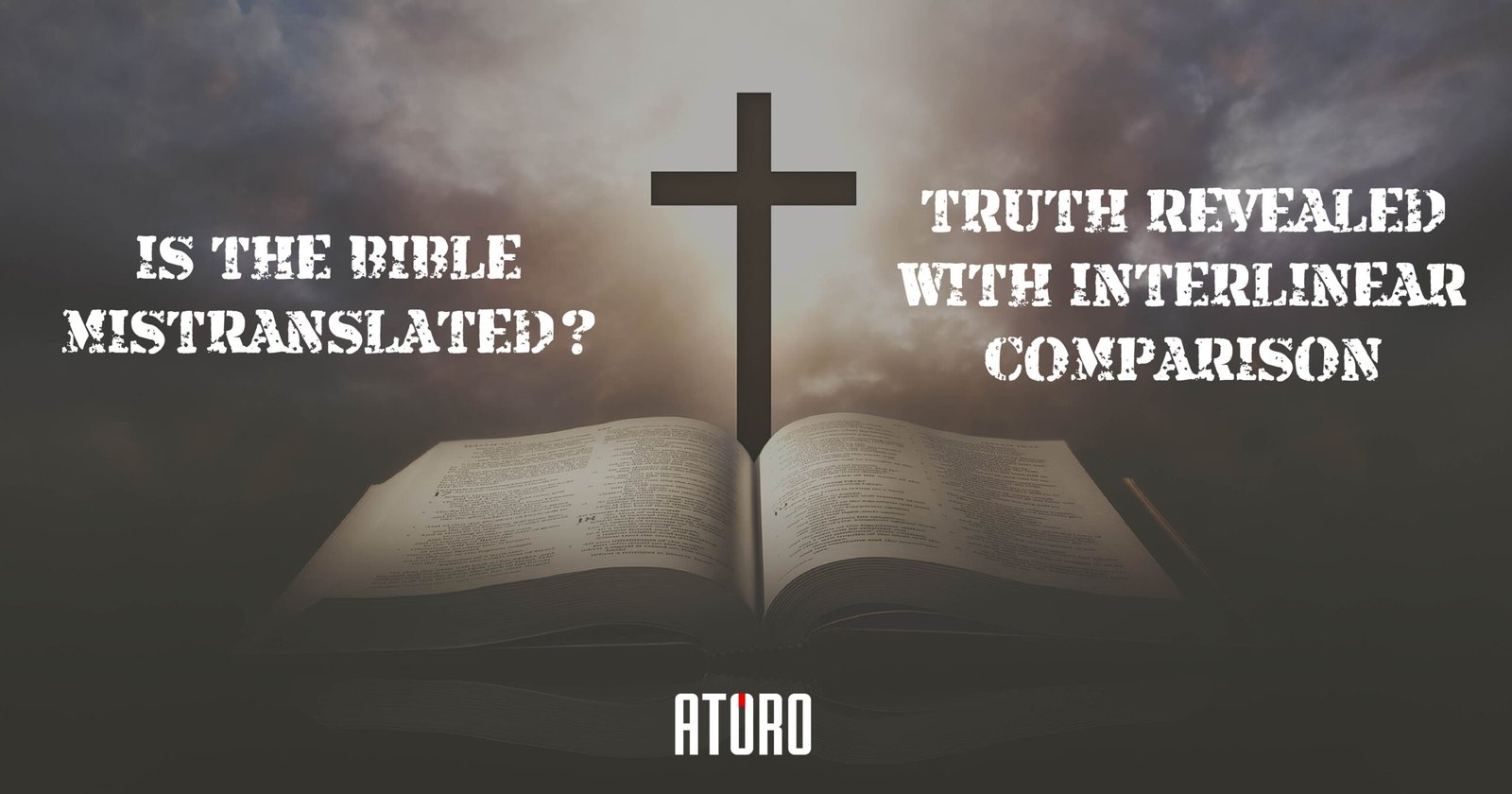Is the Bible mistranslated? Is a question many people think twice before asking. But it is the most important one.
You’re not alone if you’ve ever thought that some verses don’t add up or certain teachings seem out of place. What if the problem isn’t the message but the translation? What if the Bible you’ve trusted all your life has hidden truths buried under centuries of edits and word changes?
That’s where the Hendrickson Bible comparison comes in. When we look at the original Hebrew and Greek texts side-by-side with English, we finally see what the authors really wrote alongside what has been changed.
In this blog, we’ll walk through powerful examples from Proclaiming the Gospel of God’s Coming Kingdom on Earth. This book by ATORO dares to challenge what we’ve long accepted. Let’s find out what the Bible actually says without the filters.
Why Mistranslations Matter
When we read the Bible, we trust that the words in front of us mean exactly what God intended. But translations aren’t always perfect. They involve choices about wording, structure, and even punctuation. That’s where problems start.
Is the Bible Mistranslated? According to Proclaiming the Gospel of God’s Coming Kingdom on Earth, the answer is yes. And those mistranslations have serious consequences. A single word change or added can shift the meaning of an entire verse. A misplaced comma can create a new doctrine altogether.
For example, the KJV Bible uses the word “Gentiles” when the original word simply meant “nations.” This one change shifts the message from being directed at Israelites to seemingly applying to the whole world.
It alters who the message is for. And what it means.
Additionally, this isn’t just about language. It’s about understanding salvation, identity, and God’s promise. Therefore, it’s important to check the original text through the Hendrickson Interlinear Bible comparison. It clears the confusion and brings us closer to what God actually said.
The Power of the Interlinear Bible
So, how do we know what the original scriptures said, really? That’s where the Interlinear Bible comparison comes in. It puts the original Hebrew or Greek text side-by-side with a direct English translation. Word for word, without interpretation.
This method cuts through translator bias. It doesn’t smooth out the language or reshape verses to fit modern theology. Instead, it shows what was actually written. And lets your draw your own conclusions.
Furthermore, in Proclaiming the Gospel of God’s Coming Kingdom on Earth, ATORO uses this approach to highlight some of the most revealing mistranslations in popular Bibles. He shows how words like “Heaven,” “Gentiles,” and “paradise” have been used in ways that change the entire direction of the message.
Using an Interlinear Bible comparison not only lets you test what you have been taught against the original text, but it also helps you uncover meanings that translators have hidden or softened over time. This isn’t just a study tool. It gives you a direct path back to the truth.
Common Mistranslations Highlighted in this Book
In Proclaiming the Gospel of God’s Coming Kingdom on Earth, the author calls out several mistranslations that completely shift how people understand scripture. These aren’t just small details. They change core beliefs. Let’s look at a few of the most important and eye-opening examples.
“Gentiles” or “Nations”?
The original Hebrew and Greek texts use goyim or ethnos, meaning “nations.” However, the King James and all other translators replaced it with “Gentiles.” This one change made people believe that God’s message included everyone by default.
When you read the Interlinear Bible, you clearly see the word “nations,” not “Gentiles.” The book shows how this mistranslation misdirected the covenant promises away from Israelites and toward the rest of the world, something the original text never intended.
Heaven or Heavens?
Jesus spoke about “the kingdom of the heavens,” referring to God’s kingdom on Earth. But all the Bibles removed the word “the” and “s” and turned it into “the kingdom of the heavens.” That shift helped spread the belief that God’s people go to heaven after death.
The Interlinear comparison reveals the original wording: heavens, plural. The author explains how this change pointed people away from Earth. And away from the actual promise of a kingdom established here on earth.
The Comma That Changed the Promise
In Luke 23:43, Jesus speaks to the thief on the cross. The KJV says, “Today you will be me in paradise.” But there were no commas in the original Greek. Translators added punctuation. And they placed the comma before “today,” which made it sound like Jesus promised immediate entry into paradise.
However, if there’s a comma following the word “today,” the meaning changes: “Truly I say to you today, you will be with me in paradise.” It becomes a future promise, not an immediate one. The book uses this example to show how punctuation, even one mark, can change theology.
These examples don’t just point to small translation mistakes. They show how the text we read today often tells a different story than the one originally written.
What This Means for Believers Today
When you realize these mistranslations, it may feel overwhelming. You might wonder, Have I misunderstood everything? But don’t panic. This realization doesn’t weaken your faith. It gives you a stronger foundation.
If you ever notice a gap between the Bible’s words and what you hear in Churches, or feel confused by certain verses, remember that you’re not alone. The truth is many believers feel that way. That’s why asking questions like “is the Bible mistranslated?” matters so much.
When you use tools like Interlinear Bible comparison, you take responsibility for your faith. You stop relying on filtered interpretations and start reading what the scriptures actually say. That shift opens your eyes. And it also helps you grow deeper in truth.
The good news is that you don’t need a degree in theology to understand this. What you need instead is just a willingness to question, compare, and search with an open heart. When you approach the text with curiosity, you’ll discover insights that you have previously overlooked.
The Message of the Book
Proclaiming the Gospel of God’s Coming Kingdom on Earth doesn’t just ask, is the Bible mistranslated? It shows where, how, and why. ATORO uses an Interlinear Bible comparison to highlight major differences between what was written and what we were taught.
He doesn’t rewrite scripture; instead, he brings it back to light. The book invites readers to stop accepting watered-down truths and start reading with fresh eyes. If you’re looking for answers, then this book gives you a bold place to start.
Conclusion
So, is the Bible mistranslated? The evidence says yes. And it matters.
Don’t settle for secondhand truth. Use Interlinear Bible comparison, explore the original words, and ask the hard questions.
Proclaiming the Gospel of God’s Coming Kingdom on Earth is your guide to start that journey.
Read it. Compare it. Decide for yourself.


